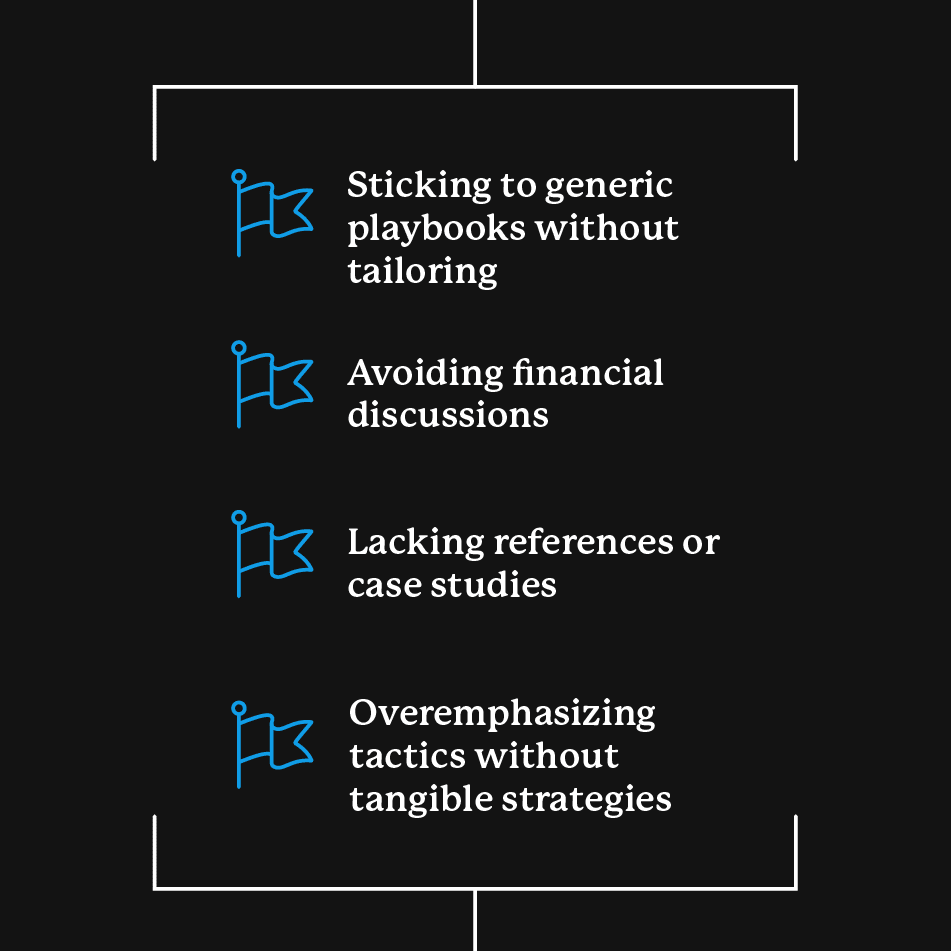So, you’ve recognized the signs that your business needs a fractional chief marketing officer (FCMO). The next question is just as important: how do you choose the right one? Not every fractional executive brings the same skills, background, or approach.
Hiring a fractional CMO involves more than verifying credentials or industry experience. The best executives combine strategic thinking with operational agility, strong communication, and a deep understanding of how marketing drives revenue.
This guide breaks down the seven traits that separate a good FCMO hire from a great one, along with practical ways to evaluate each during your search.

The 7 Must-Have Traits of a Great Fractional CMO
Choosing the right fractional CMO is a matter of finding someone who can embed effortlessly into your leadership team and connect marketing decisions directly to business outcomes.
The following traits will help you separate candidates who simply “know marketing” from those who can drive long-term growth. Use this FCMO hiring guide to find the best fractional CMO for your organization’s unique needs.
1. Strategic Vision With Business Alignment
A great fractional CMO is laser-focused on connecting marketing strategy to a business’s overall goals. Strategic vision means understanding where the company is headed, then designing marketing plans that accelerate that trajectory.
To determine whether an FCMO can truly think and operate at that level, look for evidence of alignment between strategy and measurable business outcomes. Here are some ways to vet a fractional CMO for this ability:
- Ask about their process for setting strategy. A visionary leader will explain how they start with company objectives (like ARR growth or market penetration) and build marketing plans around those goals.
- Listen for cross-functional thinking. Strong FCMOs talk about working with finance, sales, or operations to ensure alignment across departments.
- Gauge their long-term perspective. Ask how they balance quick wins with sustained growth. Visionary leaders know when to prioritize awareness, pipeline, or retention.
- Check for strategic frameworks. Effective CMOs use structured planning tools (like OKRs, growth models, or customer journey mapping) to translate business strategy into marketing execution.
In short, a CMO with real strategic vision will talk about outcomes, systems, and how marketing fuels the business engine.
2. Proven Track Record of Results
A billboard or campaign can be on-brand and look great, but that doesn’t mean it’s driving results. An FCMO should be able to demonstrate how their strategies have increased revenue, reduced acquisition costs, or unlocked new markets.
When evaluating candidates, look for proof that their strategies led to measurable business impact — not just impressions or engagement. Review case studies on their site or request ones specific to your industry. If they give you a case study, look at which metrics and key performance indicators (KPIs) they used to measure success.
- Vanity metrics include numbers like social followers, impressions, clicks, or views. They might show visibility, but they don’t necessarily reflect profit or progress.
- Performance metrics, on the other hand, tie directly to outcomes like sales, lead quality, retention rates, or marketing ROI.
A skilled fractional CMO will use both, but ultimately, it’s the performance metrics that prove business impact.
Ask to see before-and-after metrics like:
- Conversion rates
- Revenue or pipeline growth
- Customer acquisition cost (CAC) improvements
- ROI from specific campaigns or channel shifts
If they can’t provide examples with real numbers, continue your search with other candidates.
3. Clear and Confident Communication
An effective fractional CMO should be able to translate complex strategies into language everyone can act on. Their ability to align executives, boards, and teams depends on how clearly they listen, summarize, and guide.
When evaluating communication skills, pay attention to both how they speak and how they connect:
- Ask them to explain a complex concept simply. For example, say, “How would you explain marketing attribution to a non-marketing executive?” A strong communicator can make technical ideas easy to grasp without sounding condescending.
- Watch for active listening. Do they paraphrase your challenges to confirm understanding before responding? Great leaders clarify before advising.
- Look for structured storytelling. When they describe past work, do they tell it in a logical arc (the challenge, the strategy, the result) or ramble through tactics? Clear storytellers are clear thinkers.
- Notice how they handle disagreement. Ask a follow-up that challenges their perspective. Do they get defensive or engage constructively? Collaborative communicators stay open and steady.
- Ask how they communicate across teams. They should describe leading meetings, presenting to boards, or mentoring staff with equal fluency.
Strong communication is about connection, and the best FCMOs create understanding that drives alignment across every level of your business.
4. Financial and Analytical Acumen
Marketing impacts every financial line of your business. A great fractional CMO understands how marketing decisions affect revenue, margins, and overall company value, using data to drive smarter investments.
When assessing a candidate’s financial and analytical acumen, look for signs that they think like a business operator. Here’s how to vet that:
- Ask about their approach to ROI. A strong FCMO should explain how they calculate and monitor return on marketing spend by overall contribution to revenue growth or profit.
- Listen for fluency in financial metrics. They should be comfortable discussing CAC (customer acquisition cost), CLV (customer lifetime value), LTV:CAC ratios, pipeline conversion rates, and retention metrics.
- Request examples of budget allocation. Ask, “How have you shifted spend based on performance data?” The best fractional CMOs can explain when they doubled down on high-performing channels and when they cut waste.
- Look for data-driven decision-making. They should describe how they use analytics dashboards or forecasting models to adjust campaigns in real time.
- Ask how they partner with finance teams. True strategic alignment means collaborating on projections, not just marketing reports.
A financially minded FCMO treats marketing as an investment and knows how to prove its value in terms that matter to your CFO and board.
5. Adaptability Across Industries and Growth Stages
The best fractional CMOs can step into any business environment and make an impact fast. Whether your company is a scrappy startup, a scaling mid-market brand, or an established enterprise entering a new market, adaptability determines how quickly your FCMO can generate results.
A truly adaptable CMO understands that what works for one business stage or industry won’t necessarily work for another. They know how to adjust strategies to your growth phase, team maturity, and available resources.
Here’s how to assess adaptability in your search:
- Ask about transitions. Request examples of how they’ve adapted their approach when moving between industries or company sizes (e.g., startup to enterprise, B2B to DTC).
- Listen for situational thinking. A strong FCMO will describe how they tailor strategies based on budgets, timelines, and team capabilities instead of applying a one-size-fits-all playbook.
- Probe their comfort with ambiguity. Ask how they handle entering organizations without a defined process or data infrastructure. The right CMO should see this as an opportunity rather than a roadblock.
- Look for cross-industry insights. CMOs who’ve worked across multiple verticals can bring new perspectives — for example, borrowing DTC-style retention tactics for a B2B brand.
- Watch how they speak about past pivots. Do they frame challenges as learning opportunities? Adaptive leaders focus on progress over perfection.
An adaptable fractional CMO acts as both strategist and operator — quickly diagnosing what’s working, discarding what’s not, and aligning your marketing engine to your growth stage and goals.
6. Leadership & Team Integration
A great fractional CMO doesn’t operate as an outsider. Instead, they embed as part of your leadership team. They should lead with ownership, initiative, and empathy, aligning marketing with company priorities while earning the trust of your executives and staff.
Strong integration means they can quickly understand your culture, identify communication gaps, and bring cohesion across departments. Instead of a consultant who makes recommendations, you’re hiring a leader who can unite strategy and execution.
When evaluating candidates, look for signs they can lead from within:
- Ask about their first 90 days. Great FCMOs have a plan for onboarding, team assessment, and quick wins that build trust early.
- Listen for leadership language. They should speak in terms of we and our team, not you and your staff.
- Ask how they mentor and develop teams. The right leader strengthens internal capabilities.
7. Collaborative Approach With Other Executives
Collaboration is a leader’s ability to work with others while honoring their colleagues’ strengths and contributions. FCMOs should be able to collaborate and work seamlessly with different leaders and teams within your organization, including sales, operations, and finance. This will help them fully adapt to your business’ workflow and evolving needs.
When choosing a FCMO, ask about examples of when they’ve practiced cross-departmental collaboration. Look for candidates who naturally break down silos and bridge perspectives. During interviews, ask:
- “How have you aligned marketing with sales or finance in previous roles?”
- “Can you share a cross-department initiative you led that improved performance or efficiency?”
Pay attention to how they describe these collaborations. Do they frame them as joint wins? Do they emphasize communication, shared metrics, and accountability? What skills did they use to communicate and delegate duties, and what were the results?
Red Flags to Watch Out For

Not every marketer with leadership experience will make an effective fractional CMO. As you vet candidates, keep an eye out for warning signs that indicate they may struggle to deliver real business impact:
- One-size-fits-all playbooks. If they rely on the same “winning formula” for every client, they’re unlikely to tailor strategy to your unique goals or growth stage.
- Avoiding financial discussions. Great CMOs talk confidently about budgets, margins, and ROI. Evasive answers usually signal discomfort with accountability.
- No case studies or references. If they can’t point to measurable results or past leadership outcomes, proceed with caution.
- Overemphasis on tactics over strategy. Leaders who talk only about channels or creative ideas may lack big-picture thinking.

The best fractional CMOs align marketing with your business’s entire growth engine. They bring strategic vision, financial acumen, cross-departmental collaboration, and the adaptability to turn insight into measurable impact.
Avalaunch + Amplēo fractional CMOs check every box. With 30+ years of fractional leadership experience and 20 years of award-winning marketing execution, we’ve built a model that fuses strategy with delivery. Our FCMOs embed into your leadership team, backed by Avalaunch’s full-service agency capabilities — content, design, paid media, SEO, and analytics — to ensure that every plan is executed, optimized, and accountable to ROI.
This is fractional leadership done right: embedded expertise, seamless collaboration, and high-performance marketing. Ready to see what a truly embedded marketing partnership looks like? Talk with Avalaunch today to connect with a fractional CMO who can turn your goals into measurable growth.
FAQ: Choosing a Fractional CMO
avalaunchmedia.com (Article Sourced Website)
#Choose #Fractional #CMO







